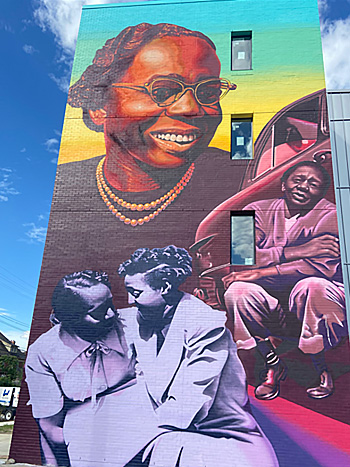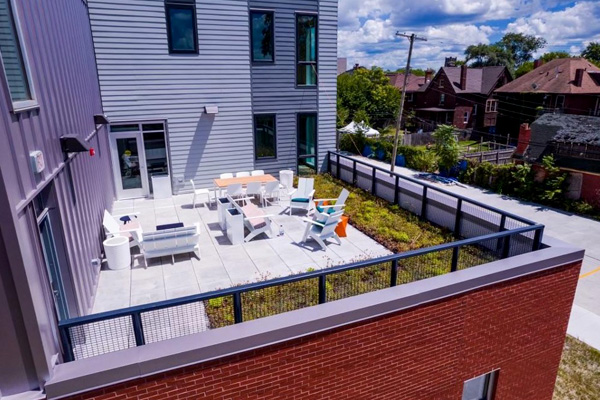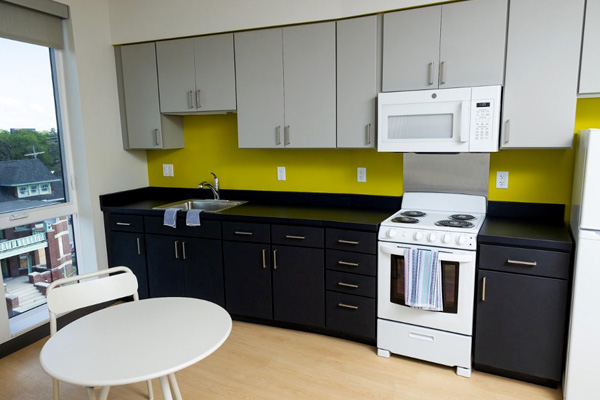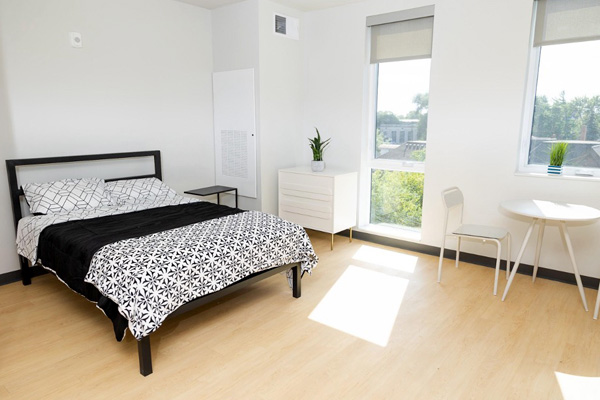Detroit's Ruth Ellis Clairmount Center Redefines Supportive Housing for LGBTQ+ Youth
 The opening of Detroit's Ruth Ellis Clairmount Center in 2022 continues the 80-year legacy of activist Ruth Ellis by providing 43 supportive housing units for LGBTQ+ youth. Photo credit: Mary Anastasia
The opening of Detroit's Ruth Ellis Clairmount Center in 2022 continues the 80-year legacy of activist Ruth Ellis by providing 43 supportive housing units for LGBTQ+ youth. Photo credit: Mary Anastasia
For decades, Black LGBTQ+ youth in Detroit have experienced disproportionately high rates of housing instability and homelessness. In the 1940s, Ruth Ellis, a Black lesbian who pioneered LGBTQ+ rights, offered her home as a safe haven for these youth and inspired the establishment of the Ruth Ellis Center in 1999. The center initially supported LGBTQ+ youth — who often experience homelessness after being rejected by their families — with hot meals, clean clothes, and recreation, but over the years, its services expanded to include a federally funded transitional living program.
Today, Ruth Ellis's legacy continues at the Ruth Ellis Clairmount Center (REC Center), a housing development offering 43 supportive housing units for LGBTQ+ youth experiencing homelessness in Detroit. Opened in 2022, the REC Center is the second housing project that the Ruth Ellis Center has sponsored. The development is a partnership between the Ruth Ellis Center and Full Circle Communities, with additional support from the Detroit City Council, the Mayor's Office, and the Detroit Continuum of Care, which has reevaluated how it prioritizes its placement of LGBTQ+ youth into permanent supportive housing thanks to this development.
Developing a Housing Program
Full Circle Communities and the Ruth Ellis Center conducted extensive focus groups and community meetings to ensure that the design and programming of the space aligned with the expressed needs and desires of LGBTQ+ youth. Construction on the REC Center began in 2020, and the center opened its doors in October 2022. The four-story building consists of commercial, office, and service spaces on the ground floor, with studios and one-bedroom residential units on the upper floors. The Michigan State Housing Development Authority subsidizes 34 of the units, and 8 unassisted, market-rate units are available for individuals who have transitioned out of rental assistance but still require residential supportive services.
 Each floor of the REC Center includes community space for residents, and the second floor features a clubhouse with a kitchen, lounge area, games, and access to a rooftop terrace. Photo credit: Mary Anastasia
Each floor of the REC Center includes community space for residents, and the second floor features a clubhouse with a kitchen, lounge area, games, and access to a rooftop terrace. Photo credit: Mary Anastasia
The Ruth Ellis Center's approach is rooted in the belief that structural inequities lead to the challenges that LGBTQ+ youth of color face. Guided by the Housing First model, the Ruth Ellis Center applies four core principles in serving LGBTQ+ youth: trauma-informed care, harm reduction, restorative justice, and positive youth development. Applying these principles involves minimizing trauma triggers, facilitating meditation as a means of conflict management, and fostering skill-building and autonomy for youth aged 18 to 24.
Access to LGBTQ+ Healthcare Services
In 2015, the Ruth Ellis Center partnered with Henry Ford Health in response to a Centers for Disease Control and Prevention report revealing the disproportionality of HIV rates in the city of Detroit. The demographics represented in that report reflected the same cohort of individuals receiving care at the Ruth Ellis Center: Black gay and bisexual young men and trans women of color, between the ages of 13 and 19. Following the report's findings, Ruth Ellis Center staff conducted focus groups. According to Mark Erwin, executive director of the center, the focus groups revealed that "40 percent of the youth that we were serving were already living with HIV, and 90 percent of those youth were not connected to any kind of continuous health care." REC also found that one significant barrier to receiving quality health care was that LGBTQ+ youth often feel unsafe in medical spaces.
 With 34 subsidized units, the development is catalyzing systemic change by prioritizing LGBTQ+ youth of color for placement in permanent supportive housing. Photo credit: Mary Anastasia
With 34 subsidized units, the development is catalyzing systemic change by prioritizing LGBTQ+ youth of color for placement in permanent supportive housing. Photo credit: Mary Anastasia
That insight from the focus groups became the basis for a multiyear service agreement with Henry Ford Health to address the healthcare disparities that LGBTQ+ youth experience. The onsite health and wellness center at Clairmount, part of Henry Ford Health's department of family medicine and infectious disease, offers expanded services, including gender-affirming health care and HIV prevention, that are sponsored by various organizations dedicated to community health.
Programming for Supportive Spaces and Community Engagement
Guiding the design of the REC Center was the idea of the "chosen family," a term common among LGBTQ+ community members who, as Erwin explains, "don't necessarily have the same connection to biological families due to rejection; these chosen families become very significant." Community spaces on every floor include living rooms with soft seating to support informal gatherings. A large community room on the second floor connects to the rooftop terrace. An expressive art therapy studio equipped with a pottery wheel, sewing supplies, and painting supplies supports residents' behavioral health needs.
 At Ruth Ellis Clairmount Center, individuals experiencing chronic homelessness receive housing, intensive case management, medical and behavioral health services, and a shared LGBTQ+ community in one setting. Photo credit: Mary Anastasia
At Ruth Ellis Clairmount Center, individuals experiencing chronic homelessness receive housing, intensive case management, medical and behavioral health services, and a shared LGBTQ+ community in one setting. Photo credit: Mary Anastasia
The REC Center hosts various community events designed to foster dialogue and awareness of issues surrounding LGBTQ+ youth and housing. The first floor has a meeting area where staff recently organized a town hall discussion on voting for heterosexual Black men. The event helped introduce the center's mission to a new audience, expanding awareness and fostering meaningful conversations. Across from the town hall area, a 3,000-square-foot health and wellness clinic features four exam rooms, four behavioral health consultation rooms, a small laboratory, and an exercise studio for yoga and movement-based therapies. An onsite pharmacy serves both residents and the public.
The Need for Continued Advocacy
Although the Ruth Ellis Center has spent more than 20 years establishing a space with supportive services specifically designed for LGBTQ+ youth, more work is needed to improve the city's housing Continuum of Care. Nazarina Mwakasege, director of development and advancement at the Ruth Ellis Center, explains that being one of the first organizations addressing LGBTQ+ housing insecurity in this way comes with triumphs and challenges, and that the organization is focusing on the sustainability of this model. Given that homelessness disproportionately affects LGBTQ+ youth nationwide, Erwin believes that policymakers and service providers should prioritize this population by offering communities across the country more guidance on how to address housing instability for LGBTQ+ youth.
Michigan Women Forward. n.d. “Ruth Ellis.” Accessed 21 February 2024; Ruth Ellis Center. n.d. “Ruth Ellis Center.” Accessed 21 February 2024; Affordable Housing Tax Credit Coalition. n.d. “Ruth Ellis Clairmount Center.” Accessed 21 February 2024; Group interview with Mark Erwin, executive director at Ruth Ellis Center; Nazarina Mwakasege, director of development and advancement at Ruth Ellis Center; and Luke Hassevoort, director of mission impact at Ruth Ellis Center, 4 March 2024. ×
Group interview with Mark Erwin, executive director at Ruth Ellis Center; Nazarina Mwakasege, director of development and advancement at Ruth Ellis Center; and Luke Hassevoort, director of mission impact at Ruth Ellis Center, 4 March 2024. ×
Ruth Ellis Center. n.d. “Ruth Ellis Center.” Accessed 21 February 2024; LBBA. n.d. “Ruth Ellis Clairmount Center.” Accessed 23 February 2024. ×
Group interview with Mark Erwin, executive director at Ruth Ellis Center; Nazarina Mwakasege, director of development and advancement at Ruth Ellis Center; and Luke Hassevoort, director of mission impact at Ruth Ellis Center, 4 March 2024. ×
Group interview with Mark Erwin; Nazarina Mwakasege, director of development and advancement at Ruth Ellis Center; and Luke Hassevoort, director of mission impact at Ruth Ellis Center, 4 March 2024; Ruth Ellis Center. n.d. “Ruth Ellis Center.” Accessed 21 February 2024; LBBA. n.d. “Ruth Ellis Clairmount Center.” Accessed 23 February 2024. ×
Group interview with Mark Erwin; Nazarina Mwakasege, director of development and advancement at Ruth Ellis Center; and Luke Hassevoort, director of mission impact at Ruth Ellis Center, 4 March 2024. ×
Group interview with Mark Erwin; Nazarina Mwakasege, director of development and advancement at Ruth Ellis Center; and Luke Hassevoort, director of mission impact at Ruth Ellis Center, 4 March 2024. ×
Full Circle Communities. n.d. “REC Center.” Accessed 23 February 2024; LBBA. n.d. “Ruth Ellis Clairmount Center.” Accessed 23 February 2024; Group interview with Mark Erwin; Nazarina Mwakasege; and Luke Hassevoort, director of mission impact at Ruth Ellis Center, 4 March 2024. ×
Group interview with Mark Erwin; Nazarina Mwakasege; and Luke Hassevoort, director of mission impact of Ruth Ellis Center, 4 March 2024. ×
